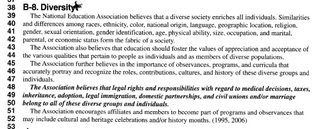The National Education Association may be backpeddling on their original language regarding gay marriage. Originally, the education union offered the following proposed resolution:
The language in this statement mailed to NEA delegates a week ago states: 
B-8 Diversity
The National Education Association believes that adiverse society enriches all individuals.Similarities and differences among races, ethnicity, color,national origin, language, geographic location,religion, gender, sexual orientation, genderidentification, age, physical ability, size,occupation, and marital, parental, or economicstatus form the fabric of a society.
The Association also believes that education should foster the values of appreciation and acceptance of the various qualities that pertain to people asindividuals and as members of diverse populations.
The Association further believes in the importance of observances, programs and curricula that accurately portray and recognize the roles, contributions,cultures. and history of these diverse groups and individuals.
The Association believes that legal rights and responsibilities with regard to medical decisions, taxes, inheritance, adoption, legal immigration, domestic partnerships, and civil unions and/or marriage belong to all these diverse groups and individuals.
The Association encourages affiliates and members to become part of programs and observances that may include cultural and heritage celebrations and/orhistory months. (1995, 2006)
However, the NEA seems to have shifted the language regarding this proposal within about a week. Here is a letter from the Ohio Education Association released yesterday.
Date: June 21, 2006 From: Gary L. Allen, OEA President
Dennis M. Reardon, Executive Director
To: OEA Executive Committee, District Leaders and OEA Staff
Re: NEA RA Anti-Discrimination Amendment and the American Family Association
We need to bring to your attention a malicious e-mail campaign to distort and criticize NEA’s position against discrimination and a proposed NEA RA resolution on that same subject.
As you know, the NEA opposes discrimination in any form and has a specific position calling for the protection of our members’ rights, regardless of race, color, creed or sexual orientation.
There is a new Resolution up for discussion at the July 2006 NEA Representative Assembly that would underscore NEA’s opposition to discrimination in any form. On June 29, the NEA Resolutions Committee will consider language that clarifies and reaffirms this
anti-discrimination position. The revised, proposed language states:
“The Association also believes that these factors should not affect the legal rights and obligations of the partners in a legally-recognized* domestic partnership, civil union, or marriage in regard to matters involving the other partner, such as medical decisions, taxes, inheritance, adoption, and immigration.â€
Nothing is official until the delegates vote in July, but this issue has already drawn an e-mail attack based on claims by the conservative group, American Family Association (AFA). The e-mail claims NEA plans “to approve and promote gay marriage.†This e-mail is being sent to NEA affiliate staff and members throughout the country.
AFA’s message distorts both NEA policy and the process of formulating NEA policy. NEA President Reg Weaver has issued a statement explaining, “NEA has no position on same-sex marriages, and leadership is not seeking to establish such a position. We are focused on Great Public Schools for Every Child.â€
We couldn’t agree more. Nevertheless, you should be prepared to answer questions from members who may have received the distorted information by e-mail. We will keep you updated.
Thanks for your support in this matter.
_____________________
*As of June 2006 in the United States, the Commonwealth of Massachusetts recognizes same-sex marriage, while California, Connecticut, the District of Columbia, Hawaii, Maine, New Jersey, and Vermont grant persons in the same-sex unions a similar legal status to those in acivil marriage by domestic partnership, civil union or reciprocal beneficiary laws.
The new proposed paragraph(s) are in bold italics. NEA insiders believe the AFA letters have provoked the NEA leadership to change the language to focus on states with existing regulations regarding gay partnerships. I cannot verify as yet which is the actual language since the delegate’s resolutions book says one thing and the more recent OEA letter says something different.
Whatever one believes about gay marriage as a social/political issue, it seems offensive to require union dues to support initiatives that may be against conscience. Certainly socially liberal members would not want the NEA to go on record as being opposed to gay marriage. Seems best to me to commit to the provision of great schools for all.
UPDATE: Here is what I am hearing this morning:
The NEA sent information to State Leaders on Tuesday about this issue, as a result of questions posed by a state president and a member ofthe NEA Executive Committee. As the result, a change was recommended to Resolutions Committee Chair, Brent McKim. The Tuesday NEA memorandum stated, “The recommended language cited below was acceptableto all. If adopted, this language is proposed for movement to Resolution B10-Racism, Sexism, Sexual Orientation, and Gender Identification Discrimination, and would clarify the meaning of the original proposed amendment, reaffirming the Association’s long-standing opposition todiscrimination in any form. This revised language will be considered at the June 29 Resolutions Committee meeting.” The proposed, revised language states: “The Association also believes that these factors should not affect the legal rights and obligations of the partners in a legally-recognized* domestic partnership, civil union, or marriage in regard to matters involving the other partner, such as medical decisions, taxes, inheritance, adoption, and immigration.”
This language is referenced in the OEA letter above. I suspect the NEA recognizes that it is losing membership among conservatives and this quick change may be a response to those concerns.
